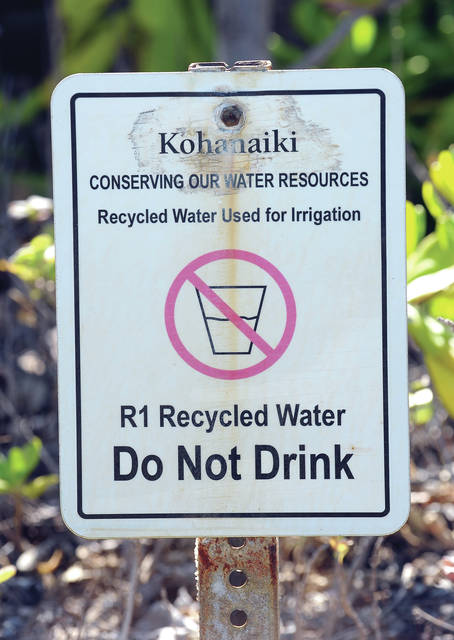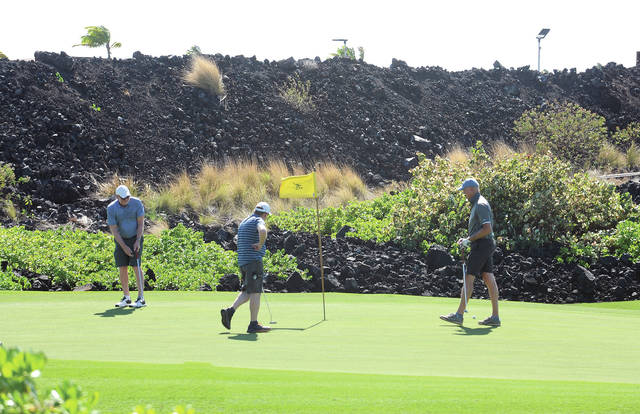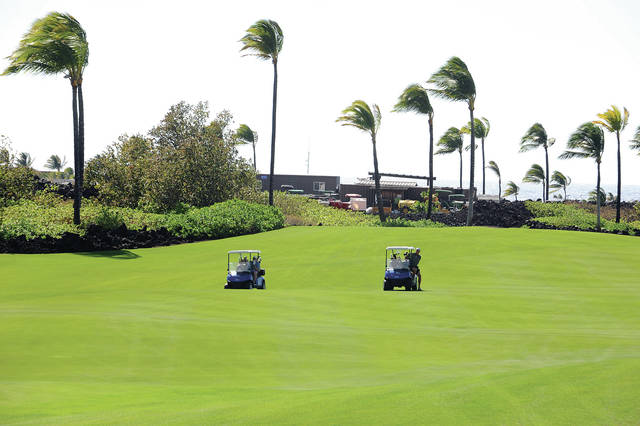KAILUA-KONA — At some point in 2020, the Department of Environmental Management will have to find somewhere to put the 1.8 million gallons of recycled water (R1 water) its Kealakehe Wastewater Treatment Plant will pump out every day.
DEM Director Bill Kucharski addressed the need for users Wednesday morning at the Environmental Management Commission’s monthly meeting in Kailua-Kona.
Already lined up are the Old Kona Airport Park and the Kohanaiki Golf and Ocean Club, the latter having expressed interest in upping its daily consumption from 500,000 to 1 million gallons, Kucharski said.
Irrigation at both sites will require the construction of transmission pipelines, according to a draft environmental impact statement released on Feb. 5. The public has until April 9 to submit comments. The draft EIS is accessible via the Office of Environmental Quality Control website at https://health.hawaii.gov/oeqc.
Kealakehe Regional Park, currently in the planning phase, will also be a user of R1 water once it’s built. If $750,000 in funding comes through from the Legislature this year, Kucharski expects the park’s construction to feature a dual piping system, the first of its kind in Kona.
Such a system would allow the park to use between 300,000 and 500,000 gallons of R1 water daily for irrigation, vehicle washing and use in park facilities.
Finally, the Queen Liliuokalani Trust development in Kona is also likely to make use of treated wastewater when that becomes necessary.
Neither the park nor the development are guaranteed to need water in the next two years, however.
Any surplus the plant produces after it’s functional will run along one of the proposed transmission lines to hook up with another line already constructed on Queen Kaahumanu Highway. From there, it will turn up Hina Lani Street to a former Department of Water Supply reservoir DEM plans to convert for R1 water storage. Though the department is hoping that won’t be necessary.
“Our goal is not to have enough recycled water,” Kucharski told the commission.
One way to ensure that would be to allow homeowners access to R1 water for situations when non-potable water usage is acceptable, such as lawn irrigation. Residential use, however, would require changes to state law.
Currently, R1 water is restricted to industrial and commercial uses. The state issues a permit and the county makes sure the user follows permit requirements.
Kucharski said legislation has been introduced this session that would allow for the expansion of R1 usage, which was a recommendation by the Water Reuse Task Force the state recently funded.
Another path to ensure the community takes full advantage of the coming water resource is to mandate it. Kucharski said Hawaii County Council member has considered introducing legislation requiring commercial and industrial concerns utilize R1 water whenever it’s available.
The council approved a sewer rate hike last week, which will nearly double the monthly fee for family residential units from $27 to $52 and is to be implemented incrementally over the next five years.
Part of the extra money is earmarked for the addition of 10 employees to manage and oversee recycled water operations, Kucharski said.











